- Home
- Nicholas Sparks
See Me
See Me Read online
Begin Reading
Table of Contents
A Preview of The Choice
Newsletters
Copyright Page
In accordance with the U.S. Copyright Act of 1976, the scanning, uploading, and electronic sharing of any part of this book without the permission of the publisher constitute unlawful piracy and theft of the author's intellectual property. If you would like to use material from the book (other than for review purposes), prior written permission must be obtained by contacting the publisher at [email protected]. Thank you for your support of the author's rights.
For Jeannie Armentrout
PROLOGUE
He hadn't been in Wilmington for more than a day before he knew it was the kind of city he'd never settle in for good. It was too touristy, and the whole place seemed as though it had grown willy-nilly, without any planning. While the historic district had the kind of porch-fronted homes he'd anticipated, with columns and detailed wainscoting and sprawling magnolia trees in the yards, those lovely neighborhoods gradually gave way to a commercial area of strip malls, convenience stores, chain restaurants, and car dealerships. Endless traffic snaked through the district, growing even more unbearable in the summers.
But the grounds of UNC Wilmington had been a pleasant surprise. Somehow, he'd imagined a campus heavy on the ugly architecture of the sixties and seventies. There were a few of those buildings, especially at the fringes of the university, but the central quads had proved to be an oasis of sorts--shaded walkways and manicured lawns, the Georgian columns and brick facades of Hoggard and Kenan Halls gleaming in the late-afternoon sunlight.
He admired the commons as well. There was a clock tower there and when he'd first arrived, he'd stared at the image reflected in the pond behind it, time itself mirrored and unreadable at a glance. As long as he had an open textbook in his lap, he could sit and watch the activities, almost invisible to the students who wandered around in their self-absorbed trances.
It was warm for late September, students lounging in shorts and tank tops, skin evident everywhere. He wondered if they dressed the same way for class. Like them, he'd come to the campus to learn. He'd visited three times in three days, but there were still too many people around; too many possible memories, and he didn't want to be remembered. He debated whether to move to another area before finally deciding there was no reason. As far as he could tell, no one cared that he was here.
He was close, so very close, but for now it was important to remain patient. He drew a long breath, holding it in before finally releasing it. On the walkways, he saw a pair of students walking to their classes, backpacks slung over their shoulders, but at this time of day, they were outnumbered by those classmates who were getting an early start to the weekend. Here and there, students were clustered in groups of three or four, talking and sipping from water bottles he suspected were filled with alcohol, while a couple of Abercrombie-model lookalikes were tossing a Frisbee back and forth, their girlfriends chatting off to the side. He spotted a young man and woman arguing, the woman's face flushed. He watched as she pushed at her boyfriend, creating space between them. He smiled at that, respecting her anger and the fact that unlike him, she wasn't compelled to hide the way she was feeling. Beyond the couple, another group of students played a game of touch football with the carefree abandon of those without real responsibility.
He figured that many of the students he saw were planning to go out tonight and tomorrow night. Fraternity houses. Sorority houses. Bars. Clubs. For many of them, the weekend would start tonight, since many classes didn't even meet on Fridays. He'd been surprised when he'd first learned that; with the cost of a college education so high, he would have thought that students would have been demanding more time in class with their professors, not three-day weekends. Then again, he supposed the schedule suited both the students and the professors. Didn't everyone want things to be easy these days? To expend the least effort possible? To take shortcuts?
Yes, he thought. That's exactly what students were learning here. They were learning that hard decisions weren't necessary, that making the right choice was unimportant, especially if it entailed extra work. Why study or try to change the world on a Friday afternoon when you could be out enjoying the sun?
Shifting his eyes from left to right, he wondered how many of these students even gave much thought to the lives they were going to lead. Cassie used to, he remembered. She thought about the future all the time. She had plans. She'd mapped out her future by seventeen, but he could remember thinking that there was something tentative about the way she'd talked about it, and he'd had the sense that she didn't quite believe in herself or the face she showed to the world. Why else would she have made the decisions that she had?
He'd tried to help her. He'd done the right thing, followed the law, filed reports with the police, even talked to the assistant district attorney. And up until that point, he'd believed in society's rules. He'd held the naive view that good would triumph over evil, that danger could be corralled, that events could be controlled. Rules would keep a person safe from harm. Cassie had believed that, too--after all, wasn't that what kids were taught when they were young? Why else would parents say the things they did? Look both ways before you cross the road. Don't get into a car with a stranger. Brush your teeth. Eat your vegetables. Put on your seat belt. The list went on and on, rules to protect and save us.
But rules could be dangerous, too, he'd learned. Rules were about averages, not specifics, and since people were conditioned since childhood to accept rules, it was easy to follow them blindly. To trust in the system. It was easier not to worry about random possibilities. It meant that people didn't have to think about potential consequences, and when the sun was shining on Friday afternoons, they could play Frisbee without a care in the world.
Experience was the most painful of teachers. For nearly two years, the lessons he'd learned had been all he could think about. They had nearly consumed him, but slowly a clarity had begun to emerge. She had known about the danger. He had warned her what would happen. And in the end, she'd cared only about following the rules, because it was convenient.
Checking his watch, he saw it was finally time to go. He closed the textbook and rose from his spot, pausing to see if his movement had caused others to notice him. It hadn't. He set off then, crossing the commons, textbook beneath his arm. In his pocket was a letter he'd written, and he veered toward the mailbox just outside the science building. He dropped the envelope through the slot and waited; a few minutes later, he spotted Serena emerging from the doors, precisely on time.
He already knew much about her. These days, it seemed that every young person had Facebook and Twitter and Instagram and Snapchat, their lives on display for anyone who cared to put the pieces together. What they liked, who their friends were, where they spent their time. He already knew from a Facebook post that she'd be having brunch at her parents' house with her sister this Sunday, and as he watched her walking ahead of him, her dark brown hair tumbling past her shoulders, he noted again how beautiful she was. There was a natural grace about her, and she drew appreciative smiles from the guys she passed, though lost in conversation, she didn't seem to notice. She was walking with a short, heavy blonde, a friend from class. They'd been in an education seminar together; he knew she wanted to become an elementary school teacher. Making plans, just like Cassie used to do.
He kept his distance, energized by the power he felt in her presence. The power he'd been husbanding for the last two years. She had no idea how close he was or what he could do. She never so much as glanced over her shoulder, but why should she? He was no one to her, just another face in the crowd...
He wondered whether she was telling the blonde about her weekend plans, rattling off places to
go or the people she intended to see. For his part, he planned to join the family for brunch on Sunday, though not as a guest. Instead, he would watch them from a nearby house, located in a neighborhood that was solidly middle class. The house had been empty for a month, the owners having lost it to foreclosure, but it was not yet up for sale. Though the locks on the doors were solid, he'd been able to gain entry through a window along the side of the house without much trouble. He already knew that from the master bedroom, he could see onto their back porch and into the kitchen. On Sunday, he'd watch the close-knit family laugh and joke at the table on the porch.
He knew something about each of them. Felix Sanchez was the classic immigrant success story; the newspaper article that was proudly laminated and on display at their restaurant chronicled how he'd arrived in the country illegally as a teenager without speaking a word of English and begun working as a dishwasher in a local restaurant. Fifteen years later, after becoming an American citizen, he'd saved enough money to open his own place in a strip mall--La Cocina de la Familia--serving his wife Carmen's recipes. While she cooked, he did everything else, especially in the early years of the business. Little by little, their restaurant had expanded, and it was now regarded as one of the best Mexican restaurants in the city. Though there were more than fifteen employees, many were relatives, retaining the restaurant's family character. Both parents still worked there, and Serena waited tables three times a week, just as her older sister, Maria, once had. Felix was a member of both the Chamber of Commerce and the Rotary Club, and he and his wife attended the seven a.m. mass at St. Mary's every Sunday, where he also served as a deacon. Carmen was a bit more of a mystery; he knew only that she was still more comfortable speaking Spanish than English and, like her husband, was proud of the fact that Maria had become the first college graduate in the family.
As for Maria...
He hadn't yet seen her in Wilmington. She'd been out of town for the last few days at a legal conference, but he knew her best of all. In the past, when she'd lived in Charlotte, he'd seen her many times. He'd talked to her. He'd tried to convince her she was wrong. And in the end, she'd made him suffer as no one should ever suffer, and he hated her for what she'd done.
When Serena waved good-bye to her friend and headed toward the parking lot, he continued walking straight. There was no reason to follow her, and he was content knowing that he'd see the small but happy family on Sunday. Especially Maria. Maria was arguably even more beautiful than her sister, though frankly, both had been winners in the genetic lottery, with their dark eyes and nearly perfect bone structure. He tried to imagine them sitting close together at the table; despite the seven-year age difference, many people might assume they were twins. And yet they were different. Where Serena was outgoing to a fault, Maria had always been quieter and driven, the more serious and studious of the two. Even so, they were close, best friends as well as sisters. He speculated that perhaps Serena saw traits in her sister that she wanted to emulate, and vice versa. He felt a frisson of excitement at the thought of the weekend, knowing it might be one of the last times the family would all be together with any semblance of normalcy. He wanted to see how they would act before tension began to infect their sweet happy family... before the fear took hold. Before their lives were slowly--and then furiously--brought to ruin.
He'd come here, after all, for a purpose, and that purpose had a name.
Its name was vengeance.
CHAPTER 1
Colin
Colin Hancock stood over the sink in the bathroom at the diner, his shirt raised to better examine the bruise on his ribs. He guessed that it would deepen to a dark purple by the time he woke tomorrow. Even grazing the bruise made him wince, and while he knew from experience that the pain could be overridden for a while, he wondered whether it would hurt to breathe in the morning.
His face, though...
That might end up being a problem--not for him, but for others. Certainly his college classmates would stare at him with wide, frightened eyes and whisper about him behind his back, though he doubted that any of them would actually ask him what had happened. During the first few weeks at the university, most of his classmates had seemed nice enough, but it had been clear that none of them knew what to make of him, nor had any tried to speak to him. Not that it bothered him. For one thing, virtually all of them were six or seven years younger than he was, all were female, and he suspected that as far as recent life experiences went, they had little in common with him. In time, like everyone else, they'd end up drawing their own conclusions about him. Frankly, it wasn't worth worrying about.
Still, he had to admit that he was particularly ghoulish right now. His left eye was swollen and the white of his right eye was a bloody red. There was a gash in the center of his forehead that had been glued back together, and the lead-colored bruise on his right cheekbone resembled a birthmark. His split, swollen lips completed the picture. What he really needed was to put an ice pack on his face as soon as possible if he wanted the girls in his classes to be able to concentrate at all. But first things first; right now, he was starved and he needed fuel. He hadn't eaten much in the last two days, and he'd wanted something fast, convenient, and--if possible--not entirely unhealthy. Unfortunately, at this time of night most places were already closed, so he'd ended up at a run-down diner just off the highway with bars on the windows, water stains on the walls, peeling linoleum on the floor, and booths held together with duct tape. But if the place had one saving grace, it was that none of the other customers cared how he looked when he made his way to the table. People who came to dives like this late at night were good at minding their own business. As far as he could tell, half the people here were trying to sober up after a night of hard drinking, while the other half--designated drivers, no doubt--were sobering up, too, only marginally less intoxicated.
It was the kind of place where it would have been easy to get in trouble, and after he'd turned into the gravel lot with Evan following in his Prius, he'd half expected Evan to keep going. But Evan must have suspected the same thing about possible trouble. It was the only reason he'd ever set foot in an establishment like this, especially at this time of night. Evan didn't exactly blend in with the late-evening crowd here, what with his pink shirt, argyle socks, leather loafers, and neatly parted sandy blond hair. In fact, his Prius might as well have been a neon sign announcing that his goal was to get beaten up by the good old boys in pickup trucks who'd just spent most of the night getting wasted.
Colin turned on the faucet and wet his hands before bringing them to his face. The water was cold, exactly what he wanted. His skin felt like it was on fire. The marine he'd fought had hit a lot harder than he'd expected--and that didn't count the illegal blows--but who would have known by looking at him? Tall and thin, jarhead haircut, goofy eyebrows... He shouldn't have underestimated the guy, and he told himself he wouldn't let it happen again. Either that, or he'd end up scaring his classmates all year long, which just might ruin the whole college experience for them. There's this super scary guy in my class with bruises all over his face and these crazy tattoos, Mom!, he could imagine them saying on the phone. And I have to sit right next to him!
He shook the water from his hands. Leaving the restroom, he spotted Evan in the corner booth. Unlike him, Evan would have fit right in at the college. He still had a baby face, and as he approached, Colin wondered how many times a week he even had to shave.
"That took you long enough," Evan said as Colin slid into the booth. "I was wondering if you got lost."
Colin slouched against the vinyl cushion. "I hope you weren't too nervous all alone out here."
"Ha, ha."
"I have a question for you."
"Go ahead."
"How many times a week do you shave?"
Evan blinked. "You were in the bathroom for ten minutes and that's what you were thinking about?"
"I wondered about it while I was walking to the table."
Evan stared
at him. "I shave every morning."
"Why?"
"What do you mean, why? For the same reason you do."
"I don't shave every morning."
"Why are we even talking about this?"
"Because I was curious and I asked and then you answered," Colin said. Ignoring Evan's expression, he nodded toward the menus. "Did you change your mind and decide to order?"
Evan shook his head. "Not a chance."
"You're not going to eat anything?"
"No."
"Acid reflux?"
"Actually, it has more to do with my suspicion that the last time the kitchen was inspected, Reagan was president."
"It's not that bad."
"Have you seen the cook?"
Colin glanced toward the grill behind the counter; the cook was right out of central casting, with a greasy apron straining to cover his ample gut, a long ponytail, and tattoos covering most of his lower arms.
"I like his tats."
"Gee, there's a surprise."
"It's the truth."
"I know. You always tell the truth. That's part of your problem."
"Why is it a problem?"
"Because people don't always want the truth. Like when your girlfriend asks if a particular outfit makes her look fat, you should tell her she looks beautiful."
"I don't have a girlfriend."
"That's probably because you told the last one she looked fat without adding the beautiful part."
"That's not what happened."
"You get my point, though. Sometimes, you need to... stretch the truth to get along with people."
"Why?"
"Because that's what normal people do. That's the way society works. You can't just tell people whatever pops into your mind. It makes them uncomfortable or hurts their feelings. And just so you know, employers hate it."
"Okay."
"You don't believe me?"
"I believe you."
"But you don't care."
"No."
"Because you'd rather tell the truth."
"Yes."

 The Notebook
The Notebook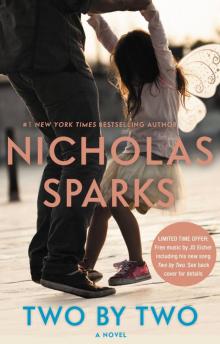 Two by Two
Two by Two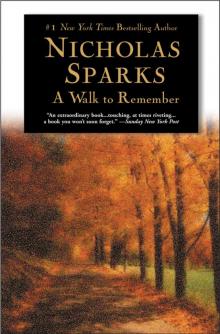 A Walk to Remember
A Walk to Remember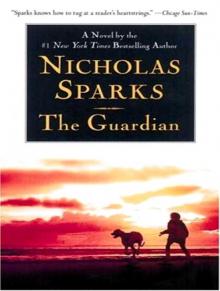 The Guardian
The Guardian Dear John
Dear John The Last Song
The Last Song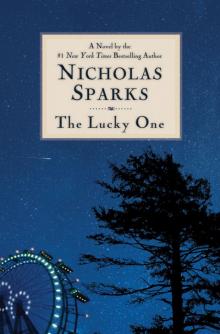 The Lucky One
The Lucky One The Wedding
The Wedding The Longest Ride
The Longest Ride Safe Haven
Safe Haven The Rescue
The Rescue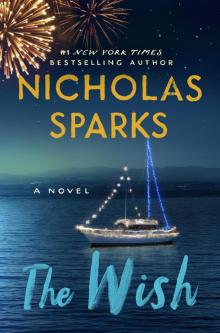 The Wish
The Wish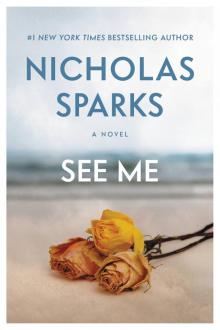 See Me
See Me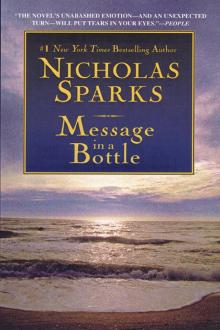 Message in a Bottle
Message in a Bottle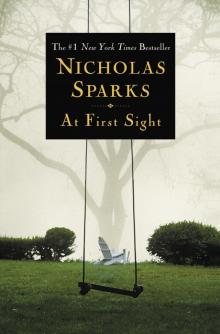 At First Sight
At First Sight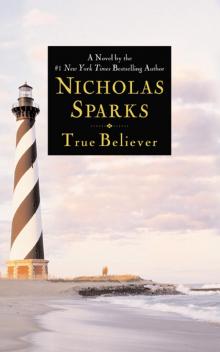 True Believer
True Believer The Return
The Return A Bend in the Road
A Bend in the Road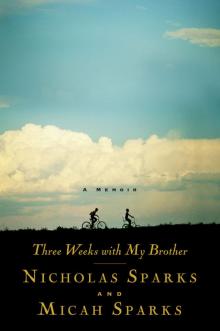 Three Weeks With My Brother
Three Weeks With My Brother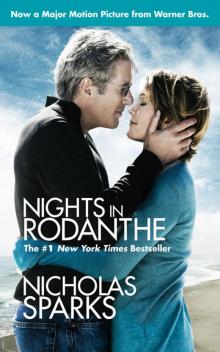 Nights in Rodanthe
Nights in Rodanthe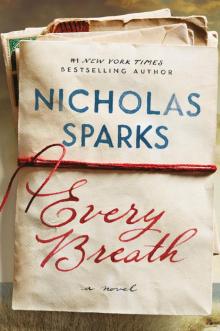 Every Breath
Every Breath